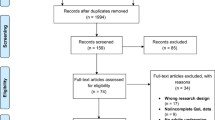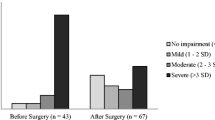Abstract
Bariatric surgery is often pursued to improve quality of life (QOL). This paper systematically reviews the literature examining QOL following bariatric surgery. Fifteen controlled trials examined changes in QOL in obese (BMI > 30) adults (18–65 years) following bariatric surgery; seven compared bariatric surgery to non-surgical interventions and six compared different types of bariatric surgery. Bariatric surgery resulted in greater improvements in QOL than other obesity treatments. Significant differences in QOL improvements were found between different types of bariatric surgery. QOL improvements were more likely to occur within the first 2 years following surgery, with greater improvements in physical QOL than mental QOL. Bariatric surgery improves QOL. Future research is needed to investigate changes in QOL in different domains in the short- and long-term following bariatric surgery.

Similar content being viewed by others
References
Oria HE, Moorehead MK. Bariatric analysis and reporting outcome system (BAROS). Obes Surg. 1998;8:487–99.
Livingston EH, Fink AS. Quality of life: cost and future of bariatric surgery. Arch Surg. 2003;138(4):383–8.
McVinnie DS. Obesity and pain. British J Pain. 2013;7(4):163–70.
Abiles V et al. Psychological characteristics of morbidly obese candidates for bariatric surgery. Obes Surg. 2010;20(2):161–7.
Van Hout GCM, Verschure SKM, Van Heck GL. Psychosocial predictors of success following bariatric surgery. Obes Surg. 2005;15(4):552–60.
Stolzenberger KM et al. Long-term quality of life following bariatric surgery: a descriptive study. Bariatr Surg Patient Care. 2013;8(1):29–38.
Van Hout GCM et al. Psychosocial functioning following bariatric surgery. Obes Surg. 2006;16(6):787–94.
Van Hout G. Psychosocial effects of bariatric surgery. Acta Chir Belg. 2005;105(1):40–3.
Livhits M et al. Preoperative predictors of weight loss following bariatric surgery: systematic review. Obes Surg. 2011;22:70–89.
Colquitt JL et al. Surgery for obesity. Cochrane Database Syst Rev. 2009;2:CD003641.
Herpertz S et al. Do psychosocial variables predict weight loss or mental health after obesity surgery? A systematic review. Obes Res. 2004;12(10):1554–69.
Dixon JB, Dixon ME, O'Brien PE. Quality of life after lap-band placement: influence of time, weight loss, and comorbidities. Obes Res. 2001;9(11):713–21.
Robert M et al. Prospective longitudinal assessment of change in health-related quality of life after adjustable gastric banding. Obes Surg. 2013;23:1564–70.
Dymek MP et al. Quality of life and psychosocial adjustment in patients after Roux-en-y gastric report bypass: a brief report. Obes Surg. 2001;11(1):32–9.
Apovian CM et al. Patient factors associated with undergoing laparoscopic adjustable gastric banding vs Roux-en-Y gastric bypass for weight loss. J Am Coll Surg. 2013;217(6):1118–25.
Herpertz S et al. Does obesity surgery improve psychosocial functioning? A systematic review. Int J Obes. 2003;27(11):1300–14.
Abdelrahman T et al. Health related quality of life reporting in bariatric surgery: a systematic review of current practice. Br J Surg. 2013;100:48–8.
Herpertz S et al. Do psychosocial variables predict weight loss or mental health after obesity surgery? A systematic review. Obes Res. 2004;12(10):1554–69.
Herpertz S et al. Does obesity surgery improve psychosocial functioning? A systematic review. Int J Obes. 2003;27(11):1300–14.
Wimmelmann CL, Dela F, Mortensen EL. Psychological predictors of weight loss after bariatric surgery: a review of the recent research. Obesity Res Clin Prac. 2014;8:299–313.
Wimmelmann CL, Dela F, Mortensen EL. Psychological predictors of mental health and health-related quality of life after bariatric surgery: a review of the recent research. Obesity Res Clin Prac. 2014;8(4):314–24.
Gregorio JM, Palkoner R. Quality of life after obesity surgery, an evidence-based medicine literature review: how to improve systematic searches for enhanced decision-making and clinical outcomes. Obes Surg. 2001;11:318–26.
Vallis MT, Ross MA. The role of psychological factors in bariatric surgery for morbid obesity: identification of psychological predictors of success. Obes Surg. 1993;3(4):346–59.
Lindekilde N et al. The impact of bariatric surgery on quality of life: a systematic review and meta-analysis. Obes Rev. 2015;16(8):639–51.
Magallares A, Schomerus G. Mental and physical health-related quality of life in obese patients before and after bariatric surgery: a meta-analysis. Psych, Health Med. 2014;20(2):165–76.
Moher D et al. Preferred reporting items for systematic reviews and meta-analyses: the PRISMA statement. Ann Intern Med. 2009;151(4):264–9.
Ware J. SF-36 physical and mental health summary scales: a user’s manual. Boston: The Health Institute, New England Medical Center; 1994.
Moorehead M et al. The validation of the Moorehead-Ardelt quality of life questionnaire II. Obes Surg. 2003;13(5):684–92.
Gilson BS et al. The sickness impact profile. Development of an outcome measure of health care. Am J Public Health. 1975;65(12):1304–10.
Tennant C. The general health questionnaire: a valid index of psychological impairment in Australian populations. Med J Aust. 1977;2(12):392–4.
Kolotkin RL, Crosby RD. Psychometric evaluation of the impact of weight on quality of life-lite questionnaire (IWQOL-lite) in a community sample. Qual Life Res. 2002;11(2):157–71.
Niero M et al. A new approach to multicultural item generation in the development of two obesity-specific measures: the Obesity and Weight Loss Quality of Life (OWLQOL) questionnaire and the Weight-Related Symptom Measure (WRSM). Clin Ther. 2002;24(4):690–700.
Adams TD et al. Health outcomes of gastric bypass patients compared to nonsurgical, nonintervened severely obese. Obesity (19307381). 2010;18(1):121–30.
Canetti L et al. Health-related quality of life changes and weight reduction after bariatric surgery vs. a weight-loss program. Isr J Psychiatry Relat Sci. 2013;50(3):194–200.
Karlsen T.I. et al.2013. Health related quality of life after gastric bypass or intensive lifestyle intervention: a controlled clinical study. Health and quality of life outcomes 11(17).
O'Brien PE et al. Intensive medical weight loss or laparoscopic adjustable gastric banding in the treatment of mild to moderate obesity: long-term follow-up of a prospective randomised trial. Obes Surg. 2013;23:1345–53. doi:10.1007/s11695-013-0990-3.
Faulconbridge LF et al. Changes in depression and quality of life in obese individuals with binge eating disorder: bariatric surgery versus lifestyle modification. Surg Obes Relat Dis. 2013;9(5):790–6.
Karlsson J, Sjostrom L, Sullivan M. Swedish obese subjects (SOS)—an intervention study of obesity. Two-year follow-up of health-related quality of life (HRQL) and eating behavior after gastric surgery for severe obesity. Int J Obes. 1998;22(2):113–26.
Canetti L, Berry EM, Elizur Y. Psychosocial predictors of weight loss and psychological adjustment following bariatric surgery and a weight-loss program: the mediating role of emotional eating. Int J Eat Disord. 2009;42(2):109–17.
Brunault P et al. Observations regarding ‘Quality of Life’ and ‘Comfort with Food’ after bariatric surgery: comparison between laparoscopic adjustable gastric banding and sleeve gastrectomy. Obes Surg. 2011;21(8):1225–31.
Lee WJ et al. Laparoscopic vertical banded gastroplasty and laparoscopic gastric bypass: a comparison. Obes Surg. 2004;14:626–34. doi:10.1381/096089204323093390.
Lee WJ et al. Laparoscopic Roux-en-Y versus mini-gastric bypass for the treatment of morbid obesity: a prospective randomized controlled clinical trial. Ann Surg. 2005;242:20–8.
Nguyen NT et al. Laparoscopic versus open gastric bypass: a randomized study of outcomes, quality of life, and costs. Annal Surg. 2001;234(3):279–91.
Puzziferri N et al. Three-year follow-up of a prospective randomized trial comparing laparoscopic versus open gastric bypass. Ann Surg. 2006;243:181–8. doi:10.1097/01.sla.0000197381.01214.76.
Suter M et al. Laparoscopic gastric banding: a prospective, randomized study comparing the Lapband and the SAGB: early results. Annals Surg. 2005;241(1):55–62.
Nguyen NT et al. Laparoscopic versus open gastric bypass: a randomized study of outcomes, quality of life, and costs. Ann Surg. 2001;234:279–89. discussion 289–91.
Picot J et al. The clinical effectiveness and cost-effectiveness of bariatric (weight loss) surgery for obesity: a systematic review and economic evaluation. Health Technol Assess. 2009;13(41):1–358.
Ballantyne GH. Measuring outcomes following bariatric surgery: weight loss parameters, improvement in co-morbid conditions, change in quality of life and patient satisfaction. Obes Surg. 2003;13(6):954–64.
Author information
Authors and Affiliations
Corresponding author
Ethics declarations
Conflict of Interest
The authors declare that they have no competing interests.
Statement of Informed Consent
Informed consent is not applicable as this is a systematic review and did not involve human participation.
Statement of Human and Animal Rights
Not applicable as this is a systematic review and did not involve human or animal participation.
Rights and permissions
About this article
Cite this article
Hachem, A., Brennan, L. Quality of Life Outcomes of Bariatric Surgery: A Systematic Review. OBES SURG 26, 395–409 (2016). https://doi.org/10.1007/s11695-015-1940-z
Published:
Issue Date:
DOI: https://doi.org/10.1007/s11695-015-1940-z




